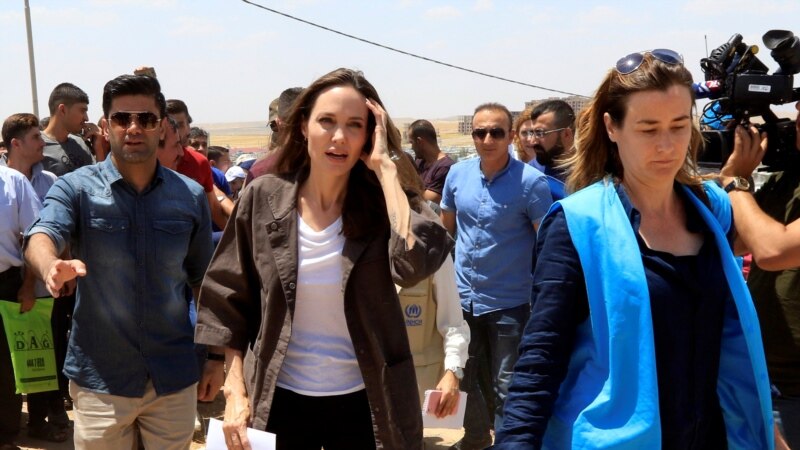
Here is a fast take on what the international community has been up to this past week, as seen from the United Nations perch.
Iran Expelled From Women’s Commission
Iran was voted off the U.N.’s Commission on the Status of Women on Wednesday for its crackdown against peaceful protesters and its repressive and discriminatory policies toward women and girls. The 54-nation Economic and Social Council voted 29-8 with 16 abstentions to remove Iran immediately from the commission, which meets for two weeks each March.
Iran Voted Off UN Group Focused on Women’s Rights
Gross Human Rights Violations Alleged in War in Ukraine
The U.N. Office of the High Commissioner for Human Rights on Thursday accused Russia of gross violations of international human rights and humanitarian law in Ukraine. The accusation was made in a report on recent developments in Russia’s war on Ukraine and was submitted to the Human Rights Council.
Gross Human Rights Violations Mark Ukraine War
Refugee Agency Concerned About Somalis in Kenyan Camp
The U.N. refugee agency warned this week that humanitarian conditions are deteriorating for tens of thousands of Somalis in Kenya’s Dadaab refugee camp as unrelenting drought grips the Horn of Africa and funding dries up.
UNHCR: Conditions Deteriorate for Somalis in Dadaab Refugee Camps
WATCH more on the drought here:
In Brief:
— The U.N. refugee agency said Friday that actress Angelina Jolie is leaving her role as UNHCR special envoy. Jolie has worked with the refugee agency for 21 years and has become a very visible and respected advocate for the plight and rights of displaced persons around the world. In a joint statement, UNHCR and Jolie said she is moving on “to engage on a broader set of humanitarian and human rights issues.” High Commissioner for Refugees Filippo Grandi thanked her for her dedication, saying she has been “an important humanitarian partner.” Jolie has carried out more than 60 field missions, most recently to Yemen and Burkina Faso. The actress and activist said she will continue “to do everything in my power in the years to come to support refugees and other displaced people. After 20 years working within the U.N. system, I feel it is time for me to work differently, engaging directly with refugees and local organizations, and supporting their advocacy for solutions.”
— On Wednesday, Secretary-General Antonio Guterres met with Honduran President Xiomara Castro at the U.N. to discuss the establishment of an international mechanism against impunity and corruption in Honduras. They signed a memorandum of understanding that laid out the terms to support the establishment of an independent, impartial and autonomous mechanism. Details on the establishment and functioning of the mechanism will be taken up in future negotiations on a bilateral agreement, a U.N. spokesperson said.
— The head of the World Health Organization told reporters Wednesday that his uncle had been “murdered” by Eritrean forces in northern Ethiopia’s Tigray region. Reuters reports that Tedros Adhanom Ghebreyesus, who comes from Tigray and has been vocal about the conflict, said at a COVID-19 news conference in Geneva that he almost canceled his attendance because he was “not in good shape” after hearing of his uncle’s “murder.” He said more than 50 other people had been killed in the same incident. He did not give any further details.
— The Pan American Health Organization delivered nearly 1.2 million doses of oral cholera vaccines to Haiti this week. PAHO plans to begin a vaccination campaign Sunday in some of the hardest-hit areas of the capital, Port-au-Prince. Vaccinations will also take place in the commune of Mirebalais, in the north. Suspected cholera cases rose almost 10% in the past week to more than 14,000. PAHO and its partners have set up 70 cholera treatment centers and rapid response teams in Haiti.
— An Irish peacekeeper was killed and three others were injured, one critically, in south Lebanon on Wednesday, just outside the UNIFIL mission’s area of operations. The victims are part of the mission, which maintains stability along the “blue line” with Israel. The mission is a relatively safe one; the last time a peacekeeper was killed in a violent incident was in 2007. Secretary-General Guterres has called for a swift investigation. Ireland’s foreign and defense minister, Simon Coveney, was at the United Nations on Thursday and said his government would also launch its own investigation, in addition to ones by the U.N. and the Lebanese authorities. He said there were two armored vehicles each with four peacekeepers driving toward the capital, Beirut. The cars were separated, and one was surrounded by what he described as a “mob,” whose members were aggressive and fired shots. He said the Lebanese government has pledged its full cooperation in the investigations.
Good news
The secretary-general said Monday that the organization has hit several gender parity goals ahead of schedule. Guterres has said one of his key strategic priorities for the U.N. is to have equal representation of male and female personnel in order to achieve gender equality in its work. In the past five years, the secretariat has achieved equality in the numbers of male and female senior officials, heads and deputy heads of peace operations, and resident coordinators. The number of U.N. entities with at least half women staff has also increased from five to 26. But progress has been slow and uneven in field missions, and Guterres said efforts would be made to improve that. Overall, he said the secretariat would be close to parity in 2025 – three years ahead of schedule.
What We Are Watching Next Week
On Monday, at 10 a.m. New York time, the secretary-general will hold his year-end news conference at U.N. headquarters. You can watch it here.
